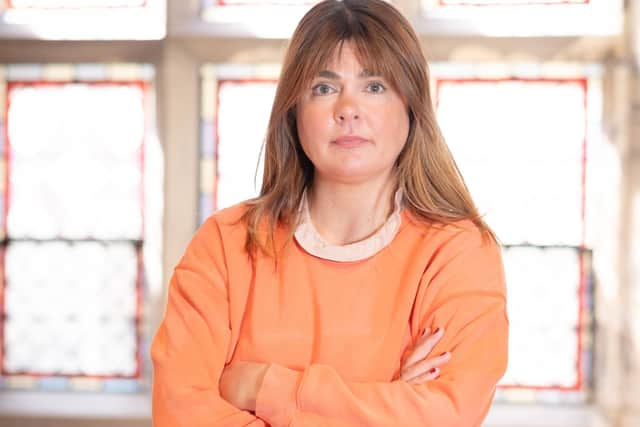'The stories are harrowing': Pregnant Then Screwed founder Joeli Brearley on fighting for the rights of mums
Around 2014, Brearley lost her job. She was told by voicemail that she was being let go, a day after informing her then employer that she was pregnant. Brearley wanted to fight the decision, but found out shortly after that she was having a high risk pregnancy, and that any stress could jeopardise the health of her baby.
“I was literally left to choose between the health of my unborn child, or accessing the justice I deserved,” she says.
Advertisement
Hide AdAdvertisement
Hide AdDue to a rule that tribunal claims must be raised within three months of discrimination occurring, Brearley adds, she was unable to fight for her case.


“I lost everything overnight, she says, “and it ate away at me. I was so furious that not only had this happened, but also that this justice system that was meant to protect me just didn't.
“Before that, I would never have called myself a feminist, and would never have considered myself to be unequal because of my biology. That time just lifted a blindfold and made me realise that the world was a very different place for me than it would be for a man. That's when the anger started.
The experience led Brearley to launch a website titled Pregnant Then Screwed, created to be a space for other mums to share their similar experiences and support each other. As the website grew, and she began to understand the scale of the issue, Brearley used her background as a charity worker to transform Pregnant Then Screwed.
Advertisement
Hide AdAdvertisement
Hide AdThe group now works as a charity, campaigning for and supporting women who experience discrimination due to pregnancy, supporting thousands of parents each year. Roughly eight years from its inception, however, Brearley believes that though there has been positive movement on childcare support, for many women, things have never been worse.
Originally from Halifax, Brearley remembers seeing how issues around childcare could affect families from a young age.
“My Mum had all the challenges of unpaid labour, caring for kids at home, and my Dad had a different, very stressful life, being the breadwinner and going out to work,” she says.
“My Dad didn't spend much time with us growing up, and my parents very much drifted apart because of it. They were such worlds apart in their experiences of day to day life that they didn't understand each other any more, and they ended up splitting up. My Dad now feels very sad that he didn't do the ‘dad thing’ and really regrets it.
Advertisement
Hide AdAdvertisement
Hide Ad“I think had the system been different, where men were encouraged to spend more time with their kids, and had there been a better parental leave system where dads were given paternity leave, their lives would have been very different. They would have been happier people, both of them.”
Earlier this year, working with the Centre for Progressive Policy, Pregnant then Screwed launched a campaign calling for six weeks paid paternity leave for second parents. The campaign follows research which found that one in three dads and second parents take no paternity leave, with the majority citing financial strain as the reason.
In 2017, Pregnant Then Screwed held its first protest, the March of the Mummies. The protest saw 15,000 parents take to the streets in 11 cities across the UK to push for “affordable, good quality child care, and a better parental leave system”.
In 2022, the group’s work was mentioned in Parliament roughly every ten days, and the charity secured £1.3 million for the women it supports
Advertisement
Hide AdAdvertisement
Hide AdDespite forward movement, however, Brearley believes that the cost-of-living crisis is exasperating issues for many parents. This year, the group is set to double the amount of women it helped compared to last year, having already aided over 4,000 women in June through its free legal advice line.
Shocking cases such as Brearley’s are also still frequently seen by the group.
We’ve seen some really extreme cases,” says Brearley.
“We’ve seen employers telling women to have abortions when they say they are pregnant. We had a story recently where a woman told her boss she was pregnant, and her boss told her if she wanted to be promoted she should terminate her pregnancy.
“She needed that promotion desperately, because she couldn't afford not to have it, so she terminated her pregnancy, and then her boss gave the promotion to someone else.
Advertisement
Hide AdAdvertisement
Hide Ad“We’ve had stories of women being told to do a shot of vodka every morning to prove they aren't pregnant, and stories of women being bullied and harassed so viciously that they go into labour and are then made redundant.
“The stories are harrowing, and not only mentally torturous, but really damaging for growing and newly-born babies. The impact is massive.”
This year, the group saw a major step forward, as Chancellor Jeremy Hunt announced £4 billion to support parents of one and two-year olds, with parents set to eventually be given 30 hours free care per week.
“I don't want us to fully take credit for that because there were lots of organisations campaigning on childcare, but we know our actions made a difference, because straight after Jeremy Hunt had finished speaking, I was invited to meet with the Secretary of State for Education and Minister for Childcare.
Advertisement
Hide AdAdvertisement
Hide Ad“It was just me, and I walked into the room and the first thing they said was: ‘Are you happy? How do you feel about this?’”
“So we know that actions like March of the Mummies work, because they prove to politicians that this is a vote winner, and it shows the strength of feeling that people really care about this, and really want these things to be fixed.”